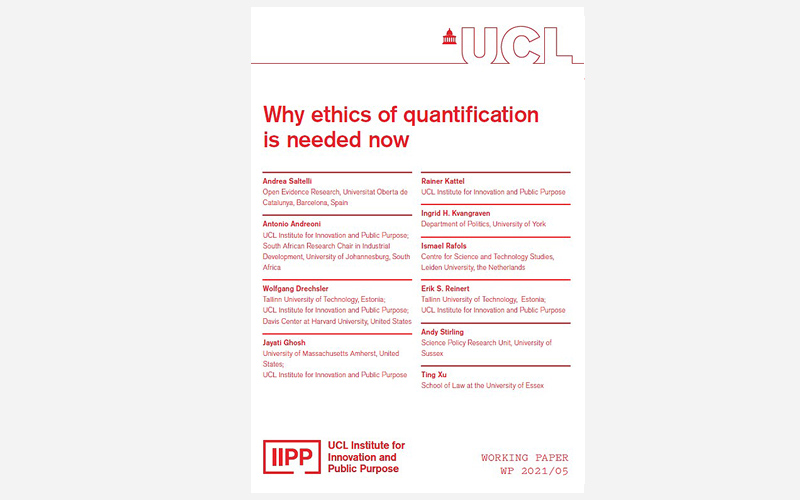Why ethics of quantification is needed now
This publication by the Institute of Innovation and Public Purpose argues why an ethics of quantification is needed now.

21 January 2021
UCL Institute for Innovation and Public Purpose (IIPP) Working Paper Series: IIPP WP 2021/05
Authors
- Andrea Saltelli | Open Evidence Research, Universitat Oberta de Catalunya, Barcelona, Spain
- Antonio Andreoni | UCL Institute for Innovation and Public Purpose; South African Research Chair in Industrial Development, University of Johannesburg, South Africa
- Wolfgang Drechsler | Tallinn University of Technology, Estonia; UCL Institute for Innovation and Public Purpose; Davis Center at Harvard University, United States
- Jayati Ghosh | University of Massachusetts Amherst, United States; UCL Institute for Innovation and Public Purpose
- Rainer Kattel | UCL Institute for Innovation and Public Purpose
- Ingrid H. Kvangraven | Department of Politics, University of York
- Ismael Rafols | Centre for Science and Technology Studies, Leiden University, the Netherlands
- Erik S. Reinhert | Tallinn University of Technology, Estonia; UCL Institute for Innovation and Public Purpose
- Andy Stirling | Science Policy Research Unit, University of Sussex
- Ting Xu | School of Law at the University of Essex
Reference
Saltelli, A., Andreoni, A., Drechsler W., Ghosh, J., Kattel, R., Kvangraven, I. H., Rafols, I., Reinert, E. S., Stirling, A. and Xu, T. (2021). Why ethics of quantification is needed now. UCL Institute for Innovation and Public Purpose, Working Paper Series (IIPP WP 2021/05). Available at: https://www.ucl.ac.uk/bartlett/public-purpose/wp2021-05
Abstract
Statistical and mathematical models, metrical objects, artificial intelligence applied to big data, all promise a better way to manage the present and the future. This proliferation of numbers, both visible and invisible, increasingly permeate the real, expanding in scope and sophistication. Not so society's capacity to adapt, manage and, when necessary, oppose, harmful or undesired effects.
Alarms against the downsides of quantification are heard from several disciplines, from within the number generating communities, as well as from outside, from sociologists, philosophers, and jurists concerned with quantification. Finance, economics, education, aid, law, environment, no field is left untouched by digits, rating, scoring and number-based decisions. The existing different instances and voices of critique may be assisted by an ethics of quantification. As part of this, an observatory is proposed here to judge of the quality of quantifications, both existing and oncoming, by tackling, in a trans-disciplinary style, different problems settings via case-studies.
 Close
Close

